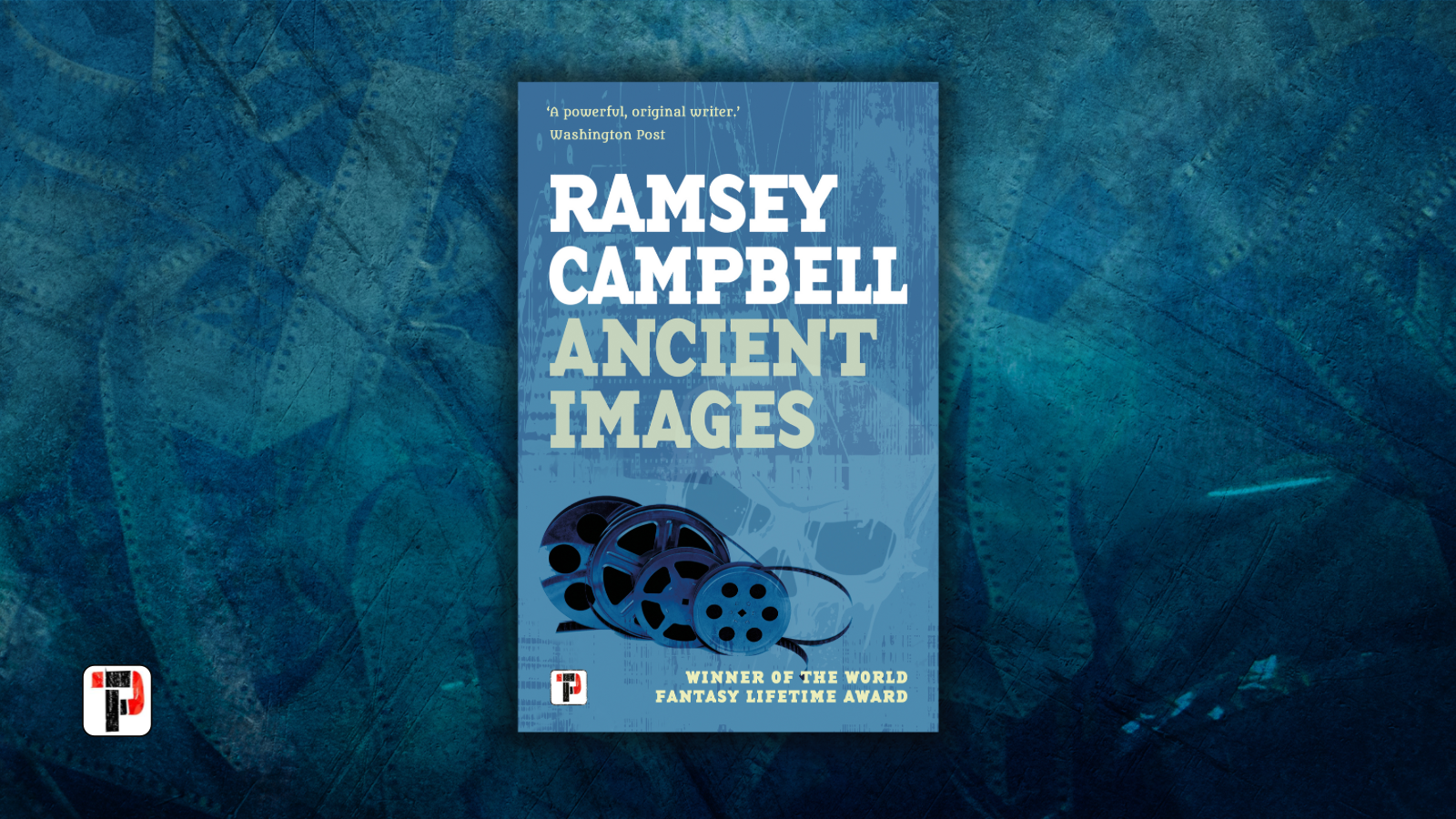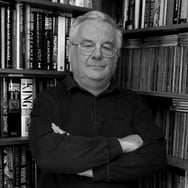Tower of Fear is a lost horror film starring Karloff and Lugosi. A film historian who locates a copy dies while fleeing something that terrified him. His friend Sandy Allan vows to prove he found the film. She learns how haunted the production was and the survivors of it still are. It contains a secret about Redfield, a titled family that owns a favourite British food, Staff o’ Life. The Redfield land has uncanny guardians, and one follows Sandy home. To maintain its fertility Redfield demands a sacrifice, and a band of new age travellers is about to set up camp there…

What is the book about?
A legendary lost horror film that stars Karloff and Lugosi is rediscovered, only to bring terror and death in its wake. The creatures it calls up are the guardians of an ancient English landscape that craves blood to keep it fertile, and by tracking down the film, researcher Sandy Allan may have made herself their prey…
What are the underlying themes?
On one level it’s a nostalgic tribute to the horror films of the thirties, which had a special meaning to me in my teens. In those days – the early 1960s – almost all horror films carried an X certificate in Britain, which theoretically meant nobody who appeared to be under sixteen was admitted to the cinema. This meant that for years after I read about them and saw stills from them, the early films of Karloff and Lugosi had to remain a legend for me, and I tried to recapture some of that quality in this novel. I also wanted to write about a film that was somehow cursed, and do I had to find a suitable curse, which turned out to be linked to a titled English family and their uncanny tradition. On top of that I went for another preoccupation of mine, film censorship (though not only that kind), which I’ve often addressed and opposed as a film reviewer. I hope the bunch of themes is at least moderately securely tied together.
Did you base your characters on anyone you knew?
Not directly, but I was the film reviewer for BBC Radio Merseyside for most of forty years, and so I met plenty of folk connected with films, both the productions and the reviewing. Some of this fed into the book (one review of which, so weirdly that I never understood it, claimed that the novel showed I didn’t like films).
Who influenced you most in the writing of the book?
The great tales of M. R. James, who could convey more uncanny dread in a sentence or indeed a phrase than most of us can achieve in a paragraph. I’ve always valued suggestion and reticence as a style of horror, and I’ve tried to employ them myself, here and elsewhere. I should also confess that Marghanita Laski’s nightmarish little tale “The Tower” (which I first read in Cynthia Asquith’s Third Ghost Book back in 1955, when I was nine) haunted me so much that I incorporated a variation on it as a chapter in this novel.
What do you mean by the tradition of horror?
I’ll try to pot some history. Poe and Le Fanu refined the Gothic novel, rendering it terser and more psychologically focused, and at greater length Mary Shelley was equally responsible for inventing modern horror and aligning it with science. M. R. James stripped Le Fanu’s methods to their absolute essence, developing his own genius for the spectrally suggestive phrase or sentence. Writers such as Walter de la Mare and Lovecraft learned from Poe. Arthur Machen and Algernon Blackwood reached for awe in their finest work and produced a special kind of terror, still unequalled. Lovecraft subsumed the influence of writers such as Blackwood and Machen as well as that of his American predecessors. Fritz Leiber united the traditions of M. R. James and Lovecraft. Shirley Jackson remains unsurpassed for subtle dread, often close to indefinable. T. E. D. Klein does too, but Machen also comes to the fore in some of Ted’s finest work. Robert Aickman demonstrated that enigmas can be more satisfying than any explanation. Stephen King rediscovers Poe for our time and pursues his own themes, not least the notion of malevolent chaos. Echoes of Robert Aickman can be found in M. John Harrison’s profoundly personal fiction, and in Terry Lamsley’s. Thomas Ligotti’s tales can be Lovecraftian, but they are remarkably unlike anybody’s work other than the author’s, although Mark Samuels has an equally distinctive worldview that earns him the comparison. There are too many first-rate authors writing in the field today to list, and I’m always afraid I’ll forget some. Look to the annual Best of the Year anthologies edited by Stephen Jones and Ellen Datlow to find them.
You’re celebrating sixty years in print as a horror writer. Aren’t you afraid of running out of material?
I haven’t yet, and I don’t feel anywhere near starting. I think horror fiction is an enormously wide field that stretches from the psychological to the physical, the ghostly to the cosmic, the uncanny to the flamboyantly monstrous, not to leave out comedy of paranoia. It lets me address everything I want to—social and mental issues, the state of the everyday world, the human tragicomedy, the supernatural... I’ve done my best not to repeat myself, though of course themes do recur. I have notebooks full of unused ideas, and I hope to develop the best of them in time, not to mention getting new ones. I hope to carry on surprising myself—that’s part of the fun of writing.
Is there any advice you can give someone starting to write?
Don’t despair, even when your work is rejected. Keep writing, and don’t leave work unfinished. Learn to enjoy rewriting as soon as you can – every piece of work needs it, believe me. tell as much of the truth as you can. Always compose at least the first sentence before you sit down to write. Identify your most creative time to write and, if you can, work then – if not, try at least to write some of your new piece every day until it’s finished.
Did you find it hard to write? Or harder to edit your own work?
I haven’t plotted a novel in advance for many years – I gather material until the book feels ready to be started. I believe in letting the tale develop organically and surprise me as it does. The dark side of this is that I can find myself stranded far out in unknown territory with no idea how to proceed, but I trust the novel to rescue me – generally there’s material earlier on that proves to be the solution to where I need to go next in the story. It certainly can be hard to write, but more often it’s rewarding, even exhilarating. I’ve come to regard the first draft as a way of setting out what I need to work with. I’m increasingly ruthless at rewriting and enjoy it a good deal.
All that said, this particular book did give me problems when I first attempted it. Whenever I tried to prepare to start it I found I couldn’t grasp the structure. At various stages I thought of doing it as a novella, maybe organised around the four seasons of the year, or using assembled documents in the manner of Dracula. I was relieved when the idea for Somebody’s Voice (also published by Flame Tree) presented itself urgently enough to take over the writing schedule. By the time that was finished I’d figured out the solution to the Fellstones issue—to make some of the supernatural events historical and only gradually discovered. Still, instinctively is the only way I know to write, and it can sometimes lead to that kind of frustration. The rewards outweigh the drawbacks.
Isn’t there enough horror in the world without creating it?
Would we say there’s enough crime in the world, and enough tragedy? Yet I’ve never heard those observations used as an argument that people should stop writing crime fiction or tragedies. For that matter, since there is indeed horror in the world, how could some art not reflect that? It’s also true that much horror fiction, whether supernatural or psychological, deals with a different kind than the horror in the news, though some of the fiction does indeed confront everyday experience.
What frightens you?
Gullibility – the human eagerness to find scapegoats – the willingness to embrace belief systems that purport to give you all the answers so long as you give up the right to question – the vulnerability of children (which concerned me all the way back in 1967, when I wrote “The Scar”) – the increasing unwillingness of people to intervene when they see or suspect wrongdoing – the plague of irrationality that the internet has helped to spread… Why would anyone ask why I write horror? Just look around you!
What are you writing now?
I’m working on a new supernatural novel, The Lonely Lands. And a personal exploration of the films of the Three Stooges, Six Stooges and Counting, appears to be nearing its end.
I’m working on a new supernatural novel, The Lonely Lands. And a personal exploration of the films of the Three Stooges, Six Stooges and Counting, appears to be nearing its end.
Author: Ramsey Campbell

Ramsey Campbell was born in Liverpool in 1946 and still lives on Merseyside. The Oxford Companion to English Literature describes him as “Britain’s most respected living horror writer”. He has been given more awards than any other writer in the field, including the Grand Master Award of the World Horror Convention, the Lifetime Achievement Award of the Horror Writers Association, the Living Legend Award of the International Horror Guild and the World Fantasy Lifetime Achievement Award.
The book is available to buy now here.



